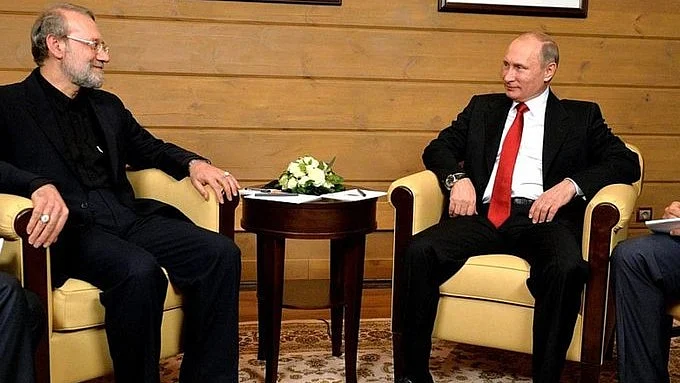In a significant diplomatic move ahead of a scheduled round of nuclear talks with the EU troika—Germany, France, and Britain—Iran’s senior political figure and close aide to Ayatollah Ali Khamenei, Ali Larijani, met Russian President Vladimir Putin in Moscow on Sunday.
The talks with the European powers, all signatories to the now-defunct 2015 nuclear deal, are set for Friday in Istanbul. That agreement, known formally as the Joint Comprehensive Plan of Action (JCPOA), had included Iran, the five permanent members of the UN Security Council, Germany, and the European Union. President Donald Trump had walked out of the deal during his first term.
Details of Larijani’s Moscow visit were sparse, and few were aware of the trip until Kremlin spokesperson Dmitry Peskov confirmed the meeting. According to Peskov, discussions focused on the "escalating situation" in West Asia and developments surrounding Iran’s nuclear program. Larijani, a key figure in the original 2015 negotiations, is believed to be relaying Tehran’s current thinking to Moscow, with whom Iran shares close political ties.
Though Russia is constrained by its ongoing war in Ukraine, Moscow has extended consistent diplomatic support to Iran, particularly in international forums. The Ayatollah wants to ensure Putin remains aligned with Tehran’s evolving position on nuclear talks. As a permanent member of the UN Security Council, Moscow’s support is important for Tehran. Russia and Iran had signed a Comprehensive Strategic Partnership agreement that was ratified by both countries in 2024. The treaty envisaged a framework for all round cooperation in security, trade, energy as well as science, education and culture.
Frosty US-Iran Track
While attention turns to Europe, prospects for renewing US-Iran nuclear negotiations will take time. US President Donald Trump in his usual style made a public announcement that Tehran was reaching out to Washington for talks. The US Middle East envoy, Steve Witkoff was also reported to have hinted at resuming negotiations with Iran, but did not specify any timeline.
Iran is unlikely to be in a hurry to restart talks. US-Iran relations had been frosty since the 1979 Iranian Revolution, and since the 12-day Iran-Israel conflict, where the US role was at best dubious while engaging in talks with Iran, building trust will be a tough ask.
Iran naturally felt 'duped' when, in the middle of nuclear negotiations with the US, Israel attacked Iran. The United States backed this 'unprovoked' Israeli assault, which violated international law and undermined ongoing diplomatic efforts. Iranian officials were preparing for the sixth round of talks with the Americans just two days before the Israeli attack. Without the US green signal, Israel would not dare bomb Iran. The meeting was naturally called off by Iran.
Adding to Iran’s anger, the US later dispatched stealth bombers carrying 30,000-pound bunker-busting bombs over Iranian nuclear sites at Fordow, Natanz, and Isfahan. Tehran views this as a serious breach of trust. No one knows how much damage was done in that strike. There are differing versions, but no consensus yet on whether the attacks had slowed down the Iranian nuclear program by one or two years or just a few months.
Now, Iranian officials are demanding a gesture of goodwill before talks can resume. "Lifting even a few of the US sanctions is not too much to ask," Iran’s ambassador to India, Iraj Elahi told 해외카지노, emphasising that Washington must first demonstrate sincerity before any further engagement can occur.
E3 warns of sanctions
UK, Germany and France, or as they are being called the E3, are warning Iran that they would restore UN sanctions on Tehran by the end of August if nuclear negotiations are not resumed. They said that sanctions could be brought in through a 'snapback' mechanism that was part of the 2015 nuclear deal.
Considering that Trump backed out of the JPCOA in 2018, to bring a clause from a non-existent pact has naturally angered Iran.
Iran’s Foreign Minister Abbas Araghchi said the Western allies had 'absolutely no moral (or) legal grounds' for reactivating the snapback sanctions.
Additionally, in a letter written to UN Secretary-General Antonio Guterres, EU’s Kaja Kallas and members of the UNSC, Araghchi said, "Through their actions and statements, including / political and material support to the recent unprovoked and illegal military aggression of the Israeli regime and the US; rejection of the main pillars of the JCPOA; and their longstanding and ongoing failure to uphold their commitments, the E3 have relinquished their role as 'Participants' in the JCPOA, making any attempt to reinstate terminated UNSC Resolutions null and void."
"The E3 cannot and should not be allowed to undermine the credibility of the UN Security Council by abusing a Resolution to which they themselves have not been committed. The E3 must heed their own advice to the US in their letter of 20 Aug 2020 and “refrain from any action that would only deepen divisions in the Security Council or that would have serious adverse consequences on its work", he added.
The foreign minister also said: "As stressed in my letter, Iran has shown that it is capable of defeating any delusional 'dirty work' but has always been prepared to reciprocate meaningful diplomacy in good faith".


















